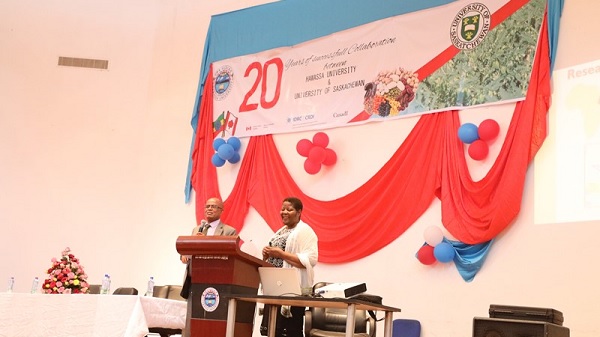
HAWASSA–Hawassa University (Hawassa, SNNPR, Ethiopia) and University of Saskatchewan (Saskatoon, SK, Canada) have celebrated their 20-year research and teaching collaboration 22-24 February, 2018 in Hawassa, Ethiopia. The first day of the anniversary was held at African Union Hall of Hawassa University (HU) on which a number of participants, mainly researchers and academicians from the two universities, made speeches and presentation, and dissemination workshops were held for the following two days at Haile Resort Hawassa. The University of Saskatchewan (U of S) delegation led by researcher Carol Henry and it was learned that Mary Buhr, dean of Agriculture and Bioresources, and Maurice Moloney, executive director and CEO of the University of Saskatchewan’s (U of S) Global Institute for Food Security, were part of U of S delegation. In addition Mr. Philip Baker, Canada’s Ambassador to Ethiopia and Mr. Santiago Alba-Corral, Associate Director – International Development Research Centre (IDRC) were invitees and presented themselves at the workshop.
On the opening speech Dr. Tesfaye Abebe, Vice President for Research and Technology Transfer, HU said that, the University has currently enrollment size of 48,000 students in its different academic programs under its 81 undergraduate, 103 masters and 16 PhD programs. Over 120 research activities have been conducted with two major guiding principles: be more responsive to the needs of communities and other stakeholders and alignment of our efforts with government’s development strategies and priorities.
Dr. Tesfaye added that, over the last five consecutive years HU has been ranked among the top three public first generation universities in Ethiopia. Certainly, collaborative projects such as the HU-U of S partnership had significant contribution in these achievements. In 20 years research collaboration of the two universities, a total of 117 graduate students (105 MSc and 12 PhD) have been supported by the project and among them 40% were female students.
Dr. Sheleme Beyene, Coordinator and Principal Investigator of Canadian Food Security and Research Fund (CIFSRF) at Hawassa University, mentioned that the project has been a collaborative venture between Ethiopia’s HU and Canada’s U of S, and it was financed by a grant from the IDRC of Canada with financial support from the Government of Canada, provided through Global Affairs Canada (GAC).
Dr. Sheleme added that based on earlier experiences and success stories, the project had embarked on scaling up of pulse innovations (chickpea and common bean) for improved local livelihood with focus on improvement of food and nutritional security, increased income, equity of gender and economic wellbeing at large.
The extension approach used in the project was innovative (cluster approach) and more than 74 thousand households has been benefited directly in which sustainability has been a key element in the project and capacity building, fulfillment of facilities and educational research grant were additional actions both parties from the agreement to 2018.
Mr. Philip Baker, Mr. Santiago Alba-Corral and Dr. Mary Buhr also delivered their speeches on the workshop.
From U of S News site, it was learned that, by developing and introducing new varieties of pulses, researchers have provided smallholder farmers with high-protein crops rich in iron and zinc to combat hunger and malnutrition. The cultivation of these plants, which have good nitrogen-fixing capabilities, has also helped improve the extremely degraded Ethiopian soil.
An interdisciplinary approach that combines soil management, processing nutrition, seed delivery systems and marketing has led to:
- Benefiting 70,000 Ethiopian households and boosting the local economy with novel soil management strategies and newly developed high-yielding pulses that produce three times more than older varieties. This means diverse sources of income and an increased number of food suppliers, with more women becoming leaders in this sector;
- Benefiting 10,000 Ethiopian households and impacting directly 36,000 women and their children through educational campaigns on the benefits of eating pulses and on food preparation to preserve the nutritious properties of these seeds;
- Successfully training [117] graduate students at Hawassa University, 40 per cent of whom are female, and having 26 U of S students visit Ethiopia to gain first-hand experience.
Building on these positive outcomes, the University of Saskatchewan and Hawassa University will collaborate with partners in Canada and sub-Saharan Africa to improve food security and sources of income for rural women, youth and their households.
